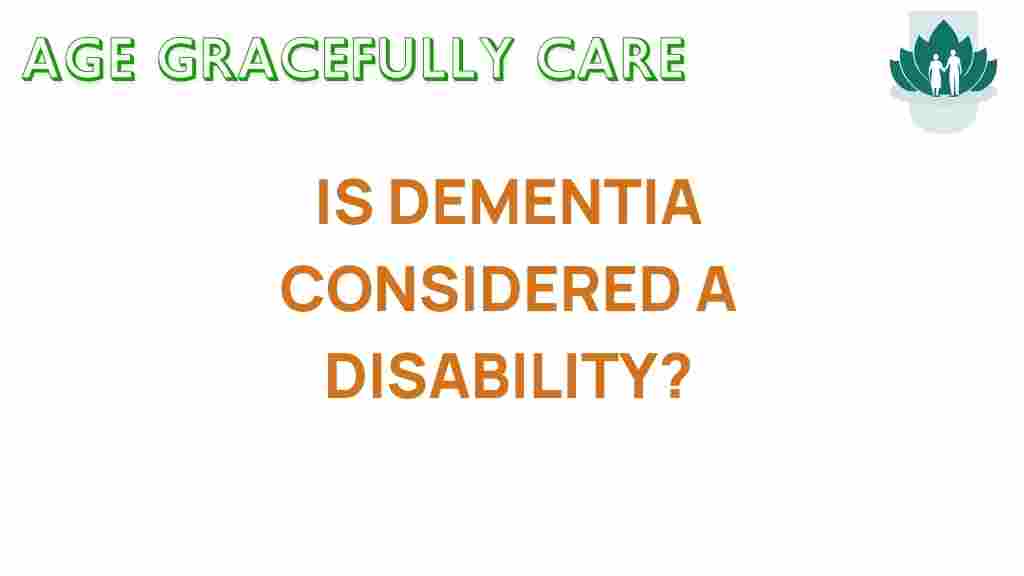Is Dementia a Disability? Understanding the Complexities of Dementia and Disability
Dementia is a term that encompasses a range of cognitive impairments, impacting memory, thinking, and social abilities severe enough to interfere with daily life. As the global population ages, the prevalence of dementia increases, leading to heightened discussions around its implications, particularly regarding whether dementia qualifies as a disability. This article aims to unpack the complexities surrounding dementia, its classification as a disability, and the implications for mental health, caregiving, and support.
Understanding Dementia
Dementia is not a single disease but a collective term that describes a variety of symptoms affecting cognitive functioning. Common forms of dementia include Alzheimer’s disease, vascular dementia, and Lewy body dementia. Each type presents unique challenges and symptoms, but they all share a common thread: a decline in mental capabilities that interferes with daily living.
The Intersection of Dementia and Disability
At its core, the discussion about dementia as a disability involves several factors, including legal definitions, societal perceptions, and the personal experiences of those affected. To better understand this relationship, let’s explore the following aspects:
- Legal Status: Different countries have varying definitions of disability. In many jurisdictions, dementia may be classified as a disability under laws that protect the rights of individuals with cognitive impairments.
- Diagnosis: A formal diagnosis of dementia, often made through cognitive assessments and medical evaluations, is crucial in determining eligibility for disability support.
- Aging: Dementia is predominantly found in older adults, raising questions about aging and its role in disability classification.
Legal Definitions of Disability
The legal definition of disability can vary widely. In the United States, the Americans with Disabilities Act (ADA) defines disability as a physical or mental impairment that substantially limits one or more major life activities. This definition can encompass dementia, depending on its severity and the extent to which it affects daily functioning.
In the UK, the Equality Act 2010 offers similar protections, stating that a disability is a physical or mental impairment that has a substantial and long-term adverse effect on a person’s ability to carry out normal day-to-day activities. Dementia, especially in its later stages, can meet this criterion.
Diagnosing Dementia: The First Step Towards Support
Diagnosis is a critical step that can pave the way for accessing support services and resources. The diagnostic process typically includes:
- Medical History: A thorough evaluation of symptoms, medical history, and family background.
- Cognitive Testing: Assessments that measure memory, problem-solving, attention, and language skills.
- Brain Imaging: MRI or CT scans may be employed to rule out other conditions.
- Neurological Examination: A comprehensive exam to assess motor skills, reflexes, and sensory responses.
Receiving a dementia diagnosis can be daunting, but it is a crucial step toward obtaining the necessary support and resources for both individuals and caregivers.
The Role of Caregiving in the Context of Dementia
As dementia progresses, individuals often require increasing levels of support. Caregivers, whether family members or professional aides, play a vital role in this process. Caregiving for someone with dementia can be both rewarding and challenging, and understanding the intricacies of this relationship is essential.
Challenges Faced by Caregivers
Caregivers may encounter various challenges, including:
- Emotional Stress: Managing the emotional toll of watching a loved one decline can lead to feelings of grief and loss.
- Physical Strain: The physical demands of caregiving can be exhausting, especially as the care recipient’s needs increase.
- Social Isolation: Caregivers often find themselves isolated from friends and family due to the time commitment required.
- Financial Burden: The cost of care and potential loss of income can create financial strain.
Support for Caregivers
To mitigate these challenges, caregivers can seek various forms of support:
- Support Groups: Connecting with others who understand the journey can provide emotional relief and practical advice.
- Respite Care: Temporary care options can give caregivers much-needed breaks.
- Education: Learning more about dementia and effective caregiving techniques can empower caregivers.
By understanding their own needs, caregivers can better support those living with dementia.
The Importance of Awareness and Support
Raising awareness about dementia and its implications is crucial for fostering a supportive environment. Increased awareness can lead to:
- Enhanced understanding of the challenges faced by individuals with dementia.
- Greater empathy toward caregivers and the importance of their role.
- Advocacy for better resources and support systems for individuals living with dementia.
Communities can play a significant role in supporting those affected by dementia through education, outreach programs, and local initiatives. Organizations like the Alzheimer’s Association provide valuable resources for both individuals and families navigating the complexities of dementia care. For more information, you can visit their website here.
Conclusion
In conclusion, the question of whether dementia is classified as a disability is multifaceted and deeply influenced by legal definitions, societal perceptions, and individual experiences. Understanding the complexities surrounding dementia, disability, mental health, caregiving, and support can foster a more compassionate and informed society. By raising awareness and advocating for the rights of those affected by dementia, we can create a supportive environment that acknowledges the challenges they face while promoting dignity and respect.
As we continue to navigate the aging population and the increase in dementia diagnoses, it is essential to remain vigilant in our support efforts, ensuring that individuals living with dementia and their caregivers receive the recognition and assistance they deserve.
This article is in the category Health and created by AgeGracefullyCare Team
